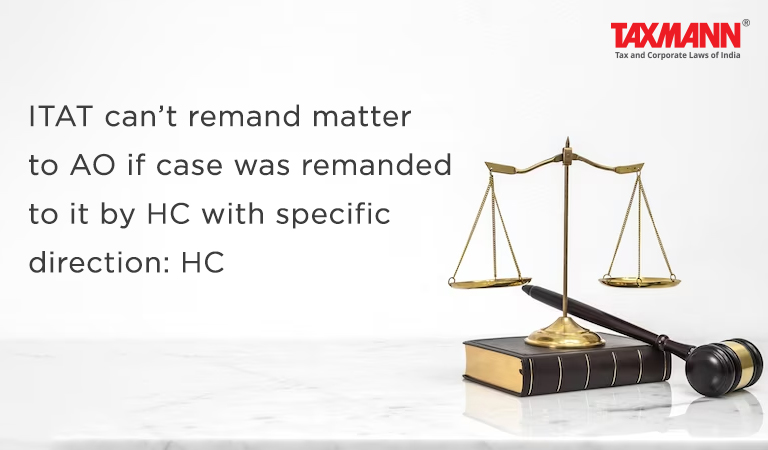ITAT can’t remand matter to AO if case was remanded to it by HC with specific direction: HC
- Blog|News|Income Tax|
- 2 Min Read
- By Taxmann
- |
- Last Updated on 13 March, 2023

Case Details: Pooja Agarwal v. Commissioner of Income-tax - [2023] 147 taxmann.com 396 (Rajasthan)
Judiciary and Counsel Details
-
- Pankaj Mithal, CJ. & Anoop Kumar Dhand, J.
- Archit Bohra for the Appellant.
- Anuroop Singhi & N.S. Bhati for the Respondent.
Facts of the Case
Assessee, an individual, incurred capital gains with respect to the sale of a particular land allegedly situated outside the municipal limits of Jaipur. Considering such land as agricultural land, the assessee filed its return of income, claiming such capital gains to be exempt. However, the Assessing Officer (AO) contended that the land was within the municipal limits and denied considering it agricultural land.
The matter reached the High Court. In disposal, the High Court gave directions to the Tribunal to consider and accordingly verify the distance of land in question from the city’s outskirts. However, in pursuance of the order, the Tribunal remanded the matter to AO for proper verification.
Consequently, a writ petition was filed to the High Court questioning whether the Tribunal was justified in remanding the matter to the AO when the directions of the High Court were strict to the ITAT itself to do the needful.
High Court Held
The High Court held that the Tribunal remanded the matter to AO merely because the distance verification required proper and supporting evidence, which was not provided to it. The Tribunal could have requested the revenue authority to make all the needed evidence available.
The Tribunal, being the last fact-finding authority, has the power to record the finding of is akin to that of the Assessing Officer/CIT (Appeals). Also, when the High Court issues the direction, the Tribunal is expected to follow the same in pith and substance.
The Tribunal, without taking the help of the Revenue Authority, remanded the matter to the AO to record finding with regard to the distance of the land. It is entirely in derogation of the spirit of the order of the High Court.
Therefore, the Tribunal manifestly erred in remanding the matter to AO instead of recording the finding with regard to the distance of the land itself and is entirely in derogation of the spirit of the order of the High Court.
List of Cases Reviewed
-
- Tribunal’s order in Ms. Pooja Agarwal v. Asstt. CIT [IT Appeal No. 927 (JP) of 2012, dated 2-12-2019] set aside.
List of Cases Referred to
-
- CIT v. Ms. Pooja Agarwal [IT Appeal No. 28 of 2014, dated 8-11-2017] (para 2).
Disclaimer: The content/information published on the website is only for general information of the user and shall not be construed as legal advice. While the Taxmann has exercised reasonable efforts to ensure the veracity of information/content published, Taxmann shall be under no liability in any manner whatsoever for incorrect information, if any.

Taxmann Publications has a dedicated in-house Research & Editorial Team. This team consists of a team of Chartered Accountants, Company Secretaries, and Lawyers. This team works under the guidance and supervision of editor-in-chief Mr Rakesh Bhargava.
The Research and Editorial Team is responsible for developing reliable and accurate content for the readers. The team follows the six-sigma approach to achieve the benchmark of zero error in its publications and research platforms. The team ensures that the following publication guidelines are thoroughly followed while developing the content:
- The statutory material is obtained only from the authorized and reliable sources
- All the latest developments in the judicial and legislative fields are covered
- Prepare the analytical write-ups on current, controversial, and important issues to help the readers to understand the concept and its implications
- Every content published by Taxmann is complete, accurate and lucid
- All evidence-based statements are supported with proper reference to Section, Circular No., Notification No. or citations
- The golden rules of grammar, style and consistency are thoroughly followed
- Font and size that’s easy to read and remain consistent across all imprint and digital publications are applied



 CA | CS | CMA
CA | CS | CMA
